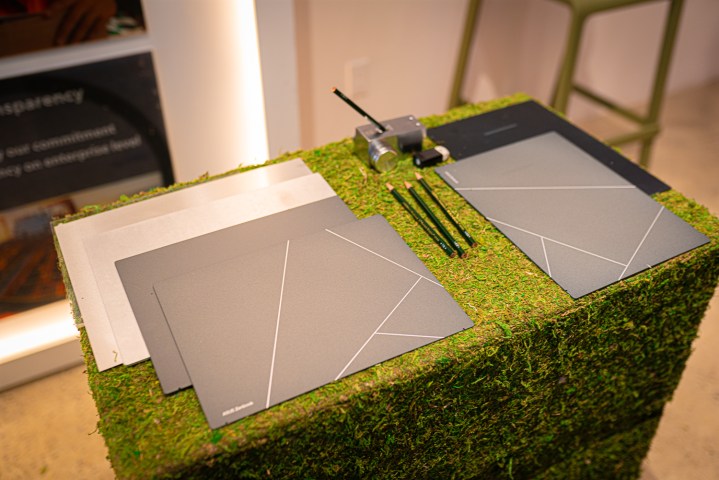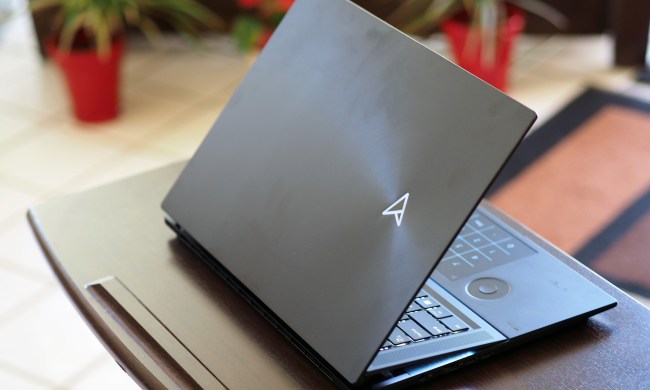Asus’ Zenbook range has always been overshadowed by brands like HP and Dell on the list of the best laptops, offering great quality and unique features, but usually with a catch, be it inconsistent performance, poor battery life, or strange configuration options. The Zenbook S 13 OLED could break that pattern, especially in the way that it compares to the MacBook Air.
A new look helps elevate the laptop beyond the storied designs of other flagships machines, and the OLED display is second to none. We still have some more testing to do to fully see where the Zenbook S 13 OLED lands, but my initial time with the machine has been very positive.
Specs and configurations

A new generation means a spec bump for most laptops, but the Zenbook S 13 OLED has a little more going on. You’re getting an Intel Core i7-1355U, along with 32GB of LPDDR5-5200 memory. There’s also a 1TB PCIe Gen 4 SSD inside.
| Asus Zenbook S 13 OLED (2023) | |
| Dimensions | 11.66 x 8.51 x 0.42 inches |
| Weight | 2.2 pounds |
| Processor | Intel Core i7-1355U |
| Graphics | Intel Xe Graphics |
| RAM | Up to 32GB LPDDR5 5200MHz |
| Display | 13.3-inch 2,880 x 1,880 OLED |
| Storage | Up to 1TB PCIe Gen 4 SSD |
| Touch | No |
| Ports | 2x Thunderbolt 4 ports, 1 x USB 3.1 Gen 2 Type A, 1x HDMI 2.1 |
| Wireless | Wi-Fi 6E and Bluetooth 5.2 |
| Webcam | 1080p + IR camera |
| Operating system | Windows 11 Pro |
| Battery | 63 watt-hour |
| Price | $1,400 |
In the previous generation, Asus offered 12th-gen Intel processors, but only inside its 2-in-1 model. The standard clamshell design was locked to AMD’s Ryzen 6000 processors. It’s not clear if Asus will also offer Ryzen 7000 CPUs in its new design once they hit shelves, but switching back to Intel is an interesting move. You’re also getting double the RAM as the previous generation, but the same amount of storage.
Asus switched up the ports too, and I’m happy with the changes. Instead of three USB-C ports, Asus splits up the ports with two Thunderbolt 4 connections and a single USB 3.2 Gen 2 Type-A port. You also get a full-sized HDMI 2.1 port, saving you some money if you want to use an external display and don’t have a Thunderbolt dock.
It’s a small change, but the addition of even a single USB-A port goes a long in helping the Zenbook S 13 OLED be more practical in day-to-day use. I won’t argue with an extra HDMI 2.1 port either, even if it’s not necessary for this type of design. Either way, it’s a big step up from options like the MacBook Pro 13-inch or MacBook Air.
This configuration, the UX5304, is the only one we have right now. Asus will likely sell at least one other configuration, but I’m not sure what its specs will be. Asus is asking $1,400 for this configuration, placing it somewhere in the range of a Macbook Pro 13 or Dell XPS 13 Plus.
Elevated Zen design

The Zenbook S 13 OLED looks incredible, and its design goes far beyond a few aesthetic changes. You have two color options, either the classic Ponder Blue or the new Basalt Gray, which at first seems like a downgrade. The previous generation offered four color options, but there’s a good reason for Asus to go back to only offering two.
The lid is created with a plasma ceramic aluminum process, which hardens raw aluminum through a chemical process carried out by a bath of water and electricity. The top lid can endure a mark with up to an 8H pencil without leaving a scratch. Compare that to traditional anodized aluminum, which can see scratches with a 5H hardness. This is the second laptop to show off this lid, which was originally debuted by the Zenbook 14X.
It’s hard to argue with extra durability, but Asus managed to elevate the look of the laptop in the process. The lid of the Zenbook S 13 OLED has a soft micro texture that’s much more appealing than an anodized top, and due to unique process of creating the lid, every laptop is a little different. That’s not to mention the cleaner process for manufacturing — unlike an anodized top, Asus’ process doesn’t require any acids or heavy metals.

But enough with the lid. It’s a nice update, but elsewhere Asus doubled down on what made the first Zenbook S 13 OLED a great 13-inch laptop. The laptop clocks in at the same 2.2 pounds as the first model, so it’s feather light. Asus managed to trim the thickness too, cutting it down from 1.5 centimeters to only 1cm. That’s slightly thinner than even the M2 MacBook Air.
It’s a highly portable laptop, so much so that Asus made some updates to keep it quiet while in use. The hinge is more aggressive in kicking up the laptop, similar to Asus’ ROG Zephyrus M16. This helps expel heat, but more importantly, it angles the keyboard so the laptop is more comfortable to type on. You can even lay the laptop flat. Speaking of the keyboard, this is the first laptop to mimic Apple’s most recent MacBook Pro design, which has a black island backdrop for its keyboard. The similarity there is unmistakable, and I doubt Asus will be the last to copy this particular design element.
The Zenbook range has always looked good — just read our Asus Zenbook 14X OLED review — but the redesign of the Zenbook S 13 OLED makes it feel unique. In a wide sea of 13-inch laptops, the Zenbook S 13 OLED feels like it stands out, and all while helping with durability and sustainability.
World-class OLED display

Asus was one of the first to debut OLED displays in laptops with machines like the Zenbook 16X OLED, and the Zenbook S13 OLED carries that torch. It has an Asus Lumina OLED display, which, according to the company, is a name only given to panels that meet Asus’ strict quality criteria.
We’ll need to test the panel further to see exactly what that criteria entails, but there’s no doubt an OLED display looks far better than an LCD like you find on the Dell XPS 13. Asus claims you’ll get a color error of less than 1, as well as a 0.2 millisecond response time. Again, we’ll need to verify those claims, but Asus has the branding to back up its specs. The display comes with DisplayHDR True Black 500, Dolby Vision, and Pantone Validated certifications.

If Asus’ previous OLED models are a hint, the Zenbook S 13 OLED will hold up. Even in my brief time with the display, colors popped off the screen. And due to the OLED panels being able to control the brightness of individual pixels, you get perfect black levels.
It comes with the same resolution and aspect ratio as previous Asus designs — 2,880 x 1,880 with a 16:10 aspect ratio — but the smaller 13.3-inch size boosts up the pixel density. At this size and resolution, the Zenbook S 13 OLED actually has a slightly higher pixel density than the Liquid Retina XDR display on the MacBook Pro 14, so it looks remarkably sharp. But compared to what’s offered in the MacBook Air, this OLED display is going to be a big upgrade in terms of image quality.
Still a lot to test

My initial impressions of the Zenbook S 13 OLED are very positive, but there’s still a lot to test. Most importantly, we’ll be testing performance and battery life to see where the laptop falls. Asus claims 14 hours of battery life, and that will be a critical area where the Zenbook S 13 OLED lives or dies.
Outside of the obvious, the webcam is another important area we’ll be focusing on. Models in the previous generation could ship with a 720p webcam, which wasn’t the best. Asus has updated the webcam to a full 1080p, but we’ll need to spend some more time with it to see how it actually looks.
For a first look, however, the Zenbook S 13 OLED is stunning. The screen is gorgeous, as we’ve come to expect from Asus’ Zenbook range, and the portability is unmatched. We’ll update this review once we’ve had some time to test the laptop fully, but it’s looking good so far.



